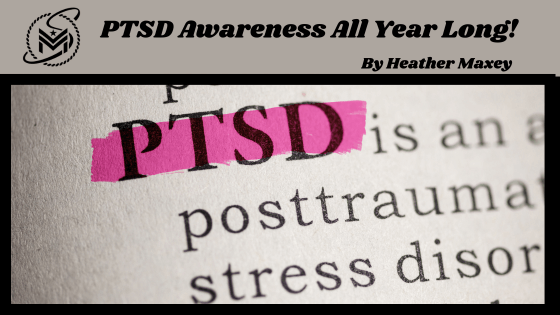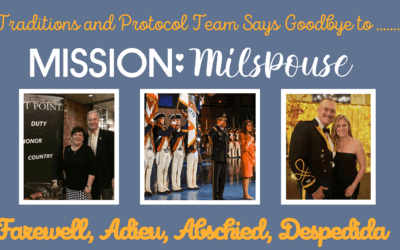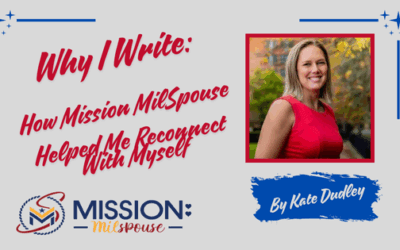PTSD Awareness Month
June is the official Post-Traumatic Stress Disorder (PTSD) Awareness Month. But here at Mission:Milspouse– we feel it is a year long awareness effort!
This condition can impact anyone, but is more prevalent among service members and veterans, and can impact their family members as well.
What is PTSD?
PTSD can happen to people who have either witnessed or experienced a traumatic event, such as abuse, a serious accident, combat, terrorism, natural disasters, or severe illness.
While many people who experience trauma do not develop PTSD, approximately 6 percent of people in the United States have the condition.
In order to be diagnosed with PTSD, a person must be experiencing symptoms that cause significant problems in their daily lives, that last for longer than one month.
While PTSD symptoms often develop within the first three months after a traumatic event, sometimes symptoms do not appear until much later, and can last for months or years.
Depression, memory issues, substance use, or physical or mental health problems can also occur with PTSD.
How does PTSD impact the military community?
PTSD affects nearly 30 percent of service members who have been deployed to Afghanistan and Iraq.
The number of veterans who have PTSD varies depending on when they served.
For Persian Gulf War veterans, approximately 21 percent have PTSD, while around 10 percent of Vietnam veterans have the condition.
Research has shown that being deployed can make someone up to three times more likely to develop PTSD than their peers who did not deploy.
What are the symptoms?
PTSD symptoms are usually classified into four main types:
Upsetting memories or nightmares: These can sometimes be so realistic and vivid that it feels as though the traumatic event is happening again (known as a flashback)
Avoiding people or situations that are a reminder of the traumatic event
Experiencing more negative thoughts and feelings than before the traumatic event, or guilt or shame around the event
Feeling on high alert, or that it is difficult to relax
How can PTSD impact the entire family?
The symptoms of PTSD can lead to a variety of relationship problems. These can include:
Lower satisfaction in a marriage or partnership
Poor mental health among partners of those with PTSD, including lowered happiness and increased stress
Additional pressure to take on tasks that the person with PTSD may be unable to handle, which can cause added stress, fatigue, or frustration for family members
Having a parent with PTSD can also impact children.
Research is being done to determine how the effects of trauma (including PTSD) may be passed from parents to children, either biologically or socially.
Some studies have found that children who have a parent with PTSD
have increased behavioral and emotional symptoms.
How families can help
While PTSD can have ripple effects across an entire family, family members can also be a valuable source of support for their loved one with PTSD. Family members can provide support in multiple ways, including:
Checking in and communicating with their loved one about what type of support would be most helpful, and listen when their loved one needs additional support.
Helping their loved one learn about different PTSD treatments and being patient while their loved one decides whether or not to pursue treatment and finds the necessary providers. This also includes coming up with a plan together, in case symptoms increase or their loved one experiences a mental health crisis
Plan for activities that the whole family can enjoy together, such as having friends over for dinner instead of going out to a restaurant.
PTSD Treatment
For veterans, this search tool can be used to find a local VA facility that offers PTSD treatment.
A PCM can also help service members and veterans find a mental health provider with experience treating PTSD.
For veterans, the VA provides a variety of PTSD resources, which can
be found here.
Military OneSource provides up to 12 counseling sessions free of charge for service members and their families, and can also provide referrals for support and treatment programs for PTSD.
Finally, the National Alliance on Mental Illness has a list of resources for those living with PTSD.
If you have PTSD, or are the friend or loved one of someone who does, you are not alone. There are many resources available to help!
Sources
https://www.samhsa.gov/blog/posttraumatic-stress-disorder-awareness-month
https://www.psychiatry.org/patients-families/ptsd/what-is-ptsd
https://pmc.ncbi.nlm.nih.gov/articles/PMC6519530/
https://www.ptsd.va.gov/understand/common/common_veterans.asphttps://
www.ptsd.va.gov/apps/AboutFace/
https://www.ptsd.va.gov/family/effect_families.asp








0 Comments